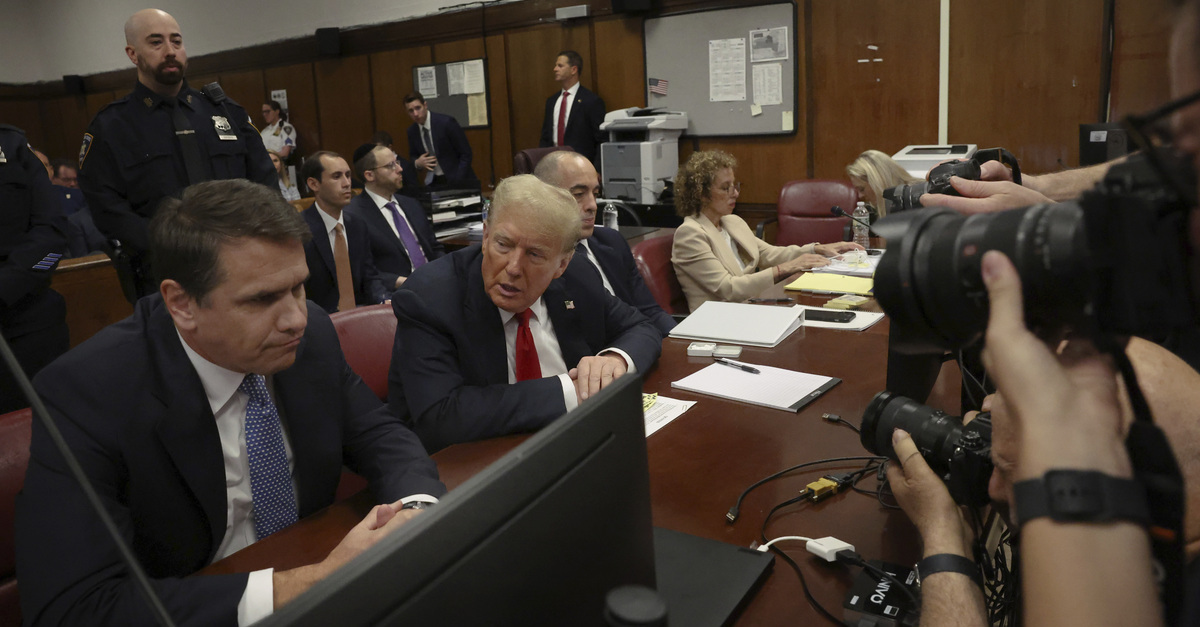
NEW YORK, NEW YORK – MAY 28: Former U.S. President Donald Trump sits in court and addresses attorney Todd Blanche during his trial for allegedly covering up hush money payments at Manhattan Criminal Court on May 28, 2024 in New York City. (Photo by Spencer Platt/Getty Images)
Closing arguments in Donald Trump’s New York City hush-money trial began with a long and winding, nearly three-hour-long, statement offered by defense attorney Todd Blanche. During a lunch recess after the pitch, the judge in charge of the case briefly upbraided the former president’s counsel for a wayward reference to punishment.
The narrative theme delivered to jurors was that Michael Cohen, 57, the state’s star witness, simply cannot be trusted.
The defense reminded the assembled Manhattan arbiters of facts that Cohen was an admitted, serial liar – using a permutation of the acronym G.O.A.T. to call Cohen the Greatest Liar Of All Time – and alleged that Cohen committed several instances of perjury during the trial, lying to each and every juror, in order to implicate Trump and shore up other pieces of his, at-times uneven, testimony.
“You cannot send somebody to prison, you cannot convict somebody based upon the words of Michael Cohen,” Blanche said, finishing his sentence over a sustained objection from the prosecution.
The defense was allowed to finish their closing argument without additional interruption, but when the jury left for lunch and just the lawyers and the judge remained in the courtroom, Assistant District Attorney Joshua Steinglass raised a motion for a curative instruction.
The complaining prosecutor characterized the defense’s reference to prison as “blatant and wholly inappropriate effort to gain sympathy” for Trump, according to a courtroom report by CBS News.
“There’s no requirement of prison,” Steinglass added, according to a report by Just Security fellow Adam Klasfeld.
More Law&Crime coverage: ‘Are you missing my point?’: Trump attorney sharply upbraided by judge after jury goes home in hush-money trial
Acting New York Supreme Court Justice Juan Merchan agreed with the prosecution, calling the comment “outrageous” and saying the remark was unlikely to have been accidental on Blanche’s part.
“You know that making a comment like that is highly inappropriate,” the judge added. “It’s simply not allowed.”
In granting the instruction, Merchan said the jurors would be apprised of the defense’s slip-up after coming back from lunch.
More Law&Crime coverage: ‘Are you staring me down right now?’: Furious judge in Trump hush-money trial clears the courtroom as defense witness gripes about court’s rulings and asks to ‘strike’ the record
Before the state begin their own predicted-be-much-longer closing statement, Assistant District Attorney Susan Hoffinger said the defense was explicitly on notice about mentioning potential punishment by way of a pretrial ruling issued by the court in March that discussed – and expressly forbade – exactly that topic.
Before the prosecution’s summation begins, Assistant DA Susan Hoffinger note there’s another reason that Blanche also should have been on notice earlier.
The judge precluded the defense from discussing potential punishment in a pre-trial ruling. pic.twitter.com/FfXDJnSO0t
— Adam Klasfeld (@KlasfeldReports) May 28, 2024
“Defendant is precluded from…making arguments and introducing evidence regarding any potential punishment or other consequences to the Defendant as a result of these proceedings,” the order read.
Blanche did not object to the curative instruction.
The judge, in turn, told the jury they could not consider potential punishment when rendering their verdict, noting that prison time is not a mandatory feature of a conviction on the charges at issue.
While prison is technically a possibility in the case, it’s no guarantee to be meted out to Trump in the event of a conviction.
A Class E, non-violent felony is considered the least severe felony under New York law. Likely punishments for first-time offenders – which Trump would be if convicted – include no jail time at all, probation, or, a sentence of between one and four years behind bars.
More Law&Crime coverage: ‘No such thing as White House arrest’: Legal experts say even a conviction in hush-money case will not put Trump behind bars
Have a tip we should know? [email protected]









